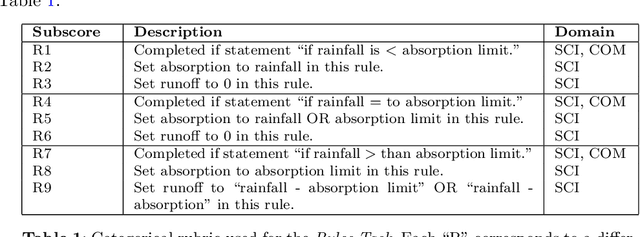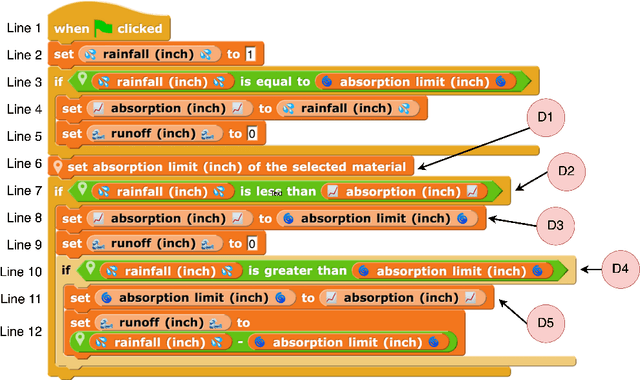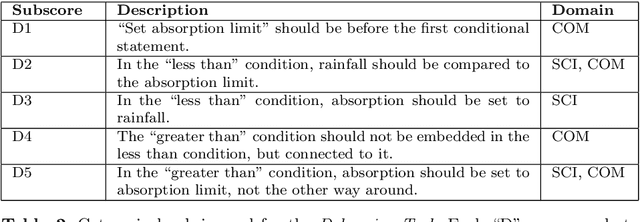Ashwin T S
Using Large Language Models to Detect Socially Shared Regulation of Collaborative Learning
Jan 08, 2026Abstract:The field of learning analytics has made notable strides in automating the detection of complex learning processes in multimodal data. However, most advancements have focused on individualized problem-solving instead of collaborative, open-ended problem-solving, which may offer both affordances (richer data) and challenges (low cohesion) to behavioral prediction. Here, we extend predictive models to automatically detect socially shared regulation of learning (SSRL) behaviors in collaborative computational modeling environments using embedding-based approaches. We leverage large language models (LLMs) as summarization tools to generate task-aware representations of student dialogue aligned with system logs. These summaries, combined with text-only embeddings, context-enriched embeddings, and log-derived features, were used to train predictive models. Results show that text-only embeddings often achieve stronger performance in detecting SSRL behaviors related to enactment or group dynamics (e.g., off-task behavior or requesting assistance). In contrast, contextual and multimodal features provide complementary benefits for constructs such as planning and reflection. Overall, our findings highlight the promise of embedding-based models for extending learning analytics by enabling scalable detection of SSRL behaviors, ultimately supporting real-time feedback and adaptive scaffolding in collaborative learning environments that teachers value.
Video-Based Performance Evaluation for ECR Drills in Synthetic Training Environments
Dec 29, 2025Abstract:Effective urban warfare training requires situational awareness and muscle memory, developed through repeated practice in realistic yet controlled environments. A key drill, Enter and Clear the Room (ECR), demands threat assessment, coordination, and securing confined spaces. The military uses Synthetic Training Environments that offer scalable, controlled settings for repeated exercises. However, automatic performance assessment remains challenging, particularly when aiming for objective evaluation of cognitive, psychomotor, and teamwork skills. Traditional methods often rely on costly, intrusive sensors or subjective human observation, limiting scalability and accuracy. This paper introduces a video-based assessment pipeline that derives performance analytics from training videos without requiring additional hardware. By utilizing computer vision models, the system extracts 2D skeletons, gaze vectors, and movement trajectories. From these data, we develop task-specific metrics that measure psychomotor fluency, situational awareness, and team coordination. These metrics feed into an extended Cognitive Task Analysis (CTA) hierarchy, which employs a weighted combination to generate overall performance scores for teamwork and cognition. We demonstrate the approach with a case study of real-world ECR drills, providing actionable, domain specific metrics that capture individual and team performance. We also discuss how these insights can support After Action Reviews with interactive dashboards within Gamemaster and the Generalized Intelligent Framework for Tutoring (GIFT), providing intuitive and understandable feedback. We conclude by addressing limitations, including tracking difficulties, ground-truth validation, and the broader applicability of our approach. Future work includes expanding analysis to 3D video data and leveraging video analysis to enable scalable evaluation within STEs.
Personalizing Student-Agent Interactions Using Log-Contextualized Retrieval Augmented Generation (RAG)
May 22, 2025Abstract:Collaborative dialogue offers rich insights into students' learning and critical thinking. This is essential for adapting pedagogical agents to students' learning and problem-solving skills in STEM+C settings. While large language models (LLMs) facilitate dynamic pedagogical interactions, potential hallucinations can undermine confidence, trust, and instructional value. Retrieval-augmented generation (RAG) grounds LLM outputs in curated knowledge, but its effectiveness depends on clear semantic links between user input and a knowledge base, which are often weak in student dialogue. We propose log-contextualized RAG (LC-RAG), which enhances RAG retrieval by incorporating environment logs to contextualize collaborative discourse. Our findings show that LC-RAG improves retrieval over a discourse-only baseline and allows our collaborative peer agent, Copa, to deliver relevant, personalized guidance that supports students' critical thinking and epistemic decision-making in a collaborative computational modeling environment, XYZ.
CoTAL: Human-in-the-Loop Prompt Engineering, Chain-of-Thought Reasoning, and Active Learning for Generalizable Formative Assessment Scoring
Apr 03, 2025



Abstract:Large language models (LLMs) have created new opportunities to assist teachers and support student learning. Methods such as chain-of-thought (CoT) prompting enable LLMs to grade formative assessments in science, providing scores and relevant feedback to students. However, the extent to which these methods generalize across curricula in multiple domains (such as science, computing, and engineering) remains largely untested. In this paper, we introduce Chain-of-Thought Prompting + Active Learning (CoTAL), an LLM-based approach to formative assessment scoring that (1) leverages Evidence-Centered Design (ECD) principles to develop curriculum-aligned formative assessments and rubrics, (2) applies human-in-the-loop prompt engineering to automate response scoring, and (3) incorporates teacher and student feedback to iteratively refine assessment questions, grading rubrics, and LLM prompts for automated grading. Our findings demonstrate that CoTAL improves GPT-4's scoring performance, achieving gains of up to 24.5% over a non-prompt-engineered baseline. Both teachers and students view CoTAL as effective in scoring and explaining student responses, each providing valuable refinements to enhance grading accuracy and explanation quality.
Keeping Teams in the Game: Predicting Dropouts in Online Problem-Based Learning Competition
Dec 27, 2023Abstract:Online learning and MOOCs have become increasingly popular in recent years, and the trend will continue, given the technology boom. There is a dire need to observe learners' behavior in these online courses, similar to what instructors do in a face-to-face classroom. Learners' strategies and activities become crucial to understanding their behavior. One major challenge in online courses is predicting and preventing dropout behavior. While several studies have tried to perform such analysis, there is still a shortage of studies that employ different data streams to understand and predict the drop rates. Moreover, studies rarely use a fully online team-based collaborative environment as their context. Thus, the current study employs an online longitudinal problem-based learning (PBL) collaborative robotics competition as the testbed. Through methodological triangulation, the study aims to predict dropout behavior via the contributions of Discourse discussion forum 'activities' of participating teams, along with a self-reported Online Learning Strategies Questionnaire (OSLQ). The study also uses Qualitative interviews to enhance the ground truth and results. The OSLQ data is collected from more than 4000 participants. Furthermore, the study seeks to establish the reliability of OSLQ to advance research within online environments. Various Machine Learning algorithms are applied to analyze the data. The findings demonstrate the reliability of OSLQ with our substantial sample size and reveal promising results for predicting the dropout rate in online competition.
 Add to Chrome
Add to Chrome Add to Firefox
Add to Firefox Add to Edge
Add to Edge